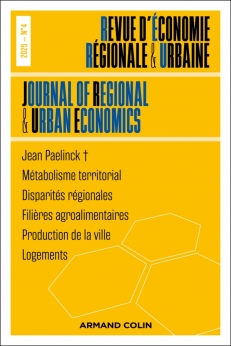
REVUE D'ÉCONOMIE RÉGIONALE ET URBAINE (4/2025)
Pour acheter ce numéro, contactez-nous
Recevez les numéros de l'année en cours et accédez à l'intégralité des articles en ligne.
La défaite d’un maire durant des élections municipales entraine-t-elle une inflexion dans le nombre de logements autorisés à la construction ? Cet article montre que le nombre de logements autorisés est peu impacté. En revanche, le taux de croissance de ces autorisations baisse significativement dans les villes où la compétition politique est la plus intense (entre -18 et -29 points). Ce changement ne semble pas correspondre à une simple désorganisation temporaire des mairies du fait du changement d’équipe. Par ailleurs, il concerne surtout la construction de logements collectifs (les immeubles). Les équipes municipales ne sont donc pas neutres pour la détermination de l’offre de logements : les nouvelles équipes pourraient être liées par des promesses de campagne appelant à la limitation de la construction quand les sortants réélus maintiennent les politiques antérieures.
In this article, I study whether a change in the municipal team ruling a municipality affects the number of new housing units allowed to be constructed in this locality. I employ a sample of approximately 5,000 French localities observed before and after the 2014 municipal elections. While I find little effect on the number of authorized housing units per se, I show that the growth rate of such a number (between the mandates 2008-2014 and 2014-2020) is substantially decreased in cities where the political competition is intense (between -18 and -29 points depending on the specification). This echoes the results in Solé-Ollé and Viladecans-Marsal (2012) who already pinpointed that the level of political competition is an important determinant of the housing supply. Moreover, this result is stronger in small municipalities, which is also coherent with the previous literature (Le Maux, 2007). This change in the growth rate does not seem to correspond to a temporary disorganization of town halls due to the renewal of the municipal team. Indeed, it is not driven by the first years of the municipal mandate. Moreover, it is also stronger for multi-family and close to zero for individual houses. This suggests a change in the relationships between mayors (or municipal teams) and large developers. Those findings generalize anecdotal evidence and suggest that municipal teams are not neutral for the determination of the housing supply: new teams could be constrained by their campaigns during which they emphasized that incumbents build too much. Consequently, they have to slow down the growth in constructions.